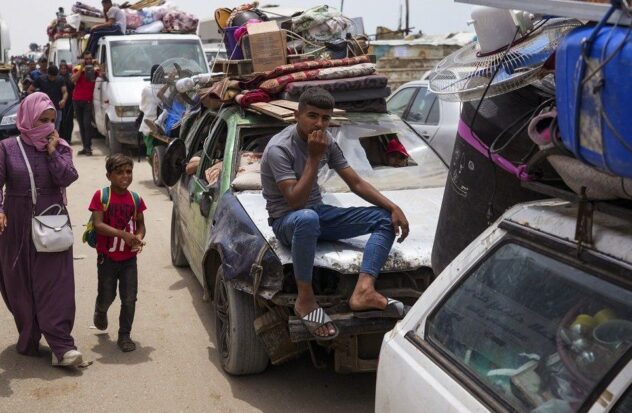TEL AVIVThe Israeli military said Wednesday it has taken control of a strategic corridor on Gaza’s border with Egypt, near the city of Rafah, where Israeli forces have recently fought.
The capture of the Philadelphi corridor indicates that Israel has deepened its offensive in southern Gaza, even as calls for restraint have been made due to recent civilian deaths.
The move could complicate relations with Egypt, which has complained about Israel’s advance on its border, such as when Israeli forces captured the Rafah border crossing, the only one between Gaza and Egypt.
The corridor is part of a larger demilitarized zone on both sides of the entire Israel-Egypt border. Under a peace agreement, each country is authorized to deploy only a small number of soldiers or border guards in the area. At the time of the deal, Israeli troops controlled Gaza, until Israel withdrew its forces and settlers in 2005.
The narrow corridor, about 100 meters (yards) wide in places, runs the entire 14 kilometers (8.6 miles) length of the Gaza side of the border with Egypt, and includes the Rafah crossing into Egypt.
It is known that there are tunnels under the area that run between Egypt and the Gaza Strip and that they are used for smuggling.
The Israeli military had no further details about the action. On Wednesday morning, a senior Israeli official said Israel’s war against Hamas would likely last until the end of the year, a grim forecast for a conflict that has now entered its eighth month and has killed tens of thousands. of people, led to Israel’s global isolation and has repeatedly brought the region to the brink of a broader conflagration.
National Security Advisor Tzachi Hanegbi made these statements as Israel expanded its offensive in the city of Rafah, in the southern Gaza Strip, which in recent days has been the scene of intense battles in which dozens of people have died. people, including displaced Palestinians. The military says three Israeli soldiers were killed on Tuesday. Israeli media reported that the servicemen were killed in an explosion inside a building.
Hanegbi told Kan public radio that “I expect another seven months of fighting” to destroy the army and governing capabilities of Hamas and Islamic Jihad, a smaller militant group.
“The army is achieving its objectives, but it said from the first days it presented its plan to the cabinet that the war would be long,” he said. “They have designated 2024 as a year of war.”
Hanegbi’s claims raise questions about the future of Gaza and the role Israel will play in it. The United States, its main ally, has demanded that Prime Minister Benjamin Netanyahu decide on a postwar vision for the Palestinian territory, and his defense minister and a senior government member have warned him that he must take steps to ensure that Israel is not left behind. bogged down in Gaza indefinitely.
Israel says it must dismantle the last Hamas battalions in Rafah. He has also said he will seek to assume indefinite security control over the Gaza Strip, even after the war.
Israel has yet to achieve its main goals of dismantling Hamas and recovering dozens of hostages captured in the October 7 attack that sparked the war.
Beyond Rafah, Israeli forces were still fighting militants in several parts of Gaza, which the army says it took control of months ago, in a possible sign of a low-level insurgency that could keep Israeli troops busy in the territory.
Fighting in Rafah has displaced one million people, according to the United Nations, and on Wednesday, Palestinians reported intense fighting in different parts of the city. Most of the people who had been in Rafah had previously been displaced from other parts of Gaza.
Source: With information from AP



